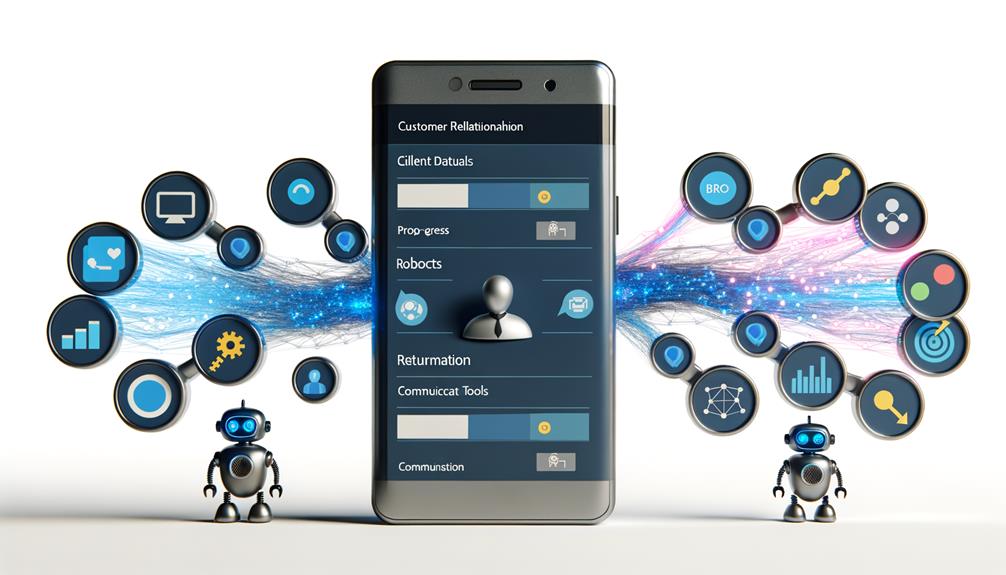Machine learning greatly enhances CRM by providing data-driven insights and aiding in customer segmentation based on behavior patterns. Fundamentally, machine learning algorithms in CRM sift through vast amounts of data, pinpointing patterns to make accurate predictions. It streamlines data collection, personalizes customer interactions, increases sales performance, and automates marketing campaigns. The result is improved decision-making, accurate forecasting, and increased ROI. Remember, high-quality data is critical for accuracy. As you further explore, you'll begin to see the concrete ways in which machine learning revolutionizes CRM strategies.
Understanding Machine Learning Basics

To truly grasp how machine learning revolutionizes CRM, you've got to get down to the nuts and bolts of this technology, starting with understanding the basics of machine learning itself. It's a sophisticated process where algorithms analyze data, making predictions without requiring human intervention. This analysis is not just random guesswork; it's a systematic approach that learns from historical data to sharpen decision-making and enhance forecasting. The automation it provides enables constant forecasting and real-time insights. However, keep in mind that data quality is critical; it guarantees accuracy, reliability, and consistency in your outcomes. The final result? Machine learning in your CRM system that helps create customer segments, identify needs, and automate marketing campaigns for improved sales performance monitoring.
Machine Learning's Role in CRM

Harnessing the power of machine learning in CRM, you're not only streamlining data collection and forecasting, but also personalizing your customer interactions, enhancing satisfaction, and optimizing your sales performance. AI's massive potential empowers businesses to segment customers based on behavioral patterns. This, in turn, enables a more personalized marketing approach, improving ROI. Machine learning's predictive analytics also identify customer needs and pain points early on, fostering opportunities for cross-selling and enhancing customer satisfaction. Additionally, machine learning in CRM automates marketing campaigns, analyzing engagement patterns to facilitate drip campaigns for lead nurturing. It's instrumental in monitoring sales performance, providing insights into the likelihood of conversions, optimizing business outcomes.
Data Collection for Machine Learning

How does data collection for machine learning enhance the functionality of CRM systems, you may ask? It's through a systematic process of gathering and analyzing customer data that CRM systems can leverage machine learning to gain insights and make accurate predictions. Here are four key steps involved:
- CRM systems collect a vast amount of data from customer interactions, purchase history, demographics, and preferences.
- This data is used to train machine learning algorithms, which are designed to learn from and make predictions based on the data.
- These algorithms require high-quality, relevant data for accurate predictions and insights.
- The data collection process is automated, ensuring real-time access to up-to-date information for analysis.
Benefits of Machine Learning in CRM

Imagine the power of accurate sales forecasting, the ability to anticipate your customer's needs, and the opportunity to design personalized marketing campaigns. That's the magic machine learning brings to Customer Relationship Management (CRM). It's not just about data, it's about harnessing that data to enhance customer experience, increase ROI and drive your business success.
Enhanced Sales Forecasting
When you incorporate machine learning into your CRM, it not only allows for more accurate sales forecasting based on analysis of historical data, but it also enhances the prediction of customer behavior patterns, leading to improved sales predictions. Four key benefits emerge as a result:
- Historical Data Analysis: ML algorithms dig deep into past data, identifying trends and opportunities that might've been overlooked.
- Predictive Power: Machine Learning's ability to predict customer behavior patterns allows for improved revenue projections.
- Data-Driven Decisions: Enhanced sales forecasting helps in making informed, data-driven decisions, minimizing guesswork.
- Accuracy: Machine Learning's advanced algorithms boost the accuracy of sales forecasts, contributing to better business planning and strategy.
Predictive Analytics Advantages
Through the lens of predictive analytics, machine learning in CRM, you'll find a myriad of advantages that greatly enhance your business operations. Sales forecasting, for instance, sees up to a 10% boost in accuracy thanks to machine learning's ability to analyze historical data and predict future trends. This same function also impacts lead scoring. Machine learning algorithms can increase its precision by 10-15%, helping you identify high-quality leads more effectively.
Additionally, personalized marketing campaigns, informed by predictive analytics, can improve conversion rates by 20%. Another significant advantage is the reduction of customer churn. Machine learning in CRM can identify at-risk customers proactively, leading to a 25% decrease in churn rates. In sum, predictive analytics in CRM, powered by machine learning, offers a host of benefits that can optimize your business operations.
Personalized Marketing Efforts
In the domain of CRM, machine learning's ability to analyze customer data and behavior patterns plays a pivotal role in enabling personalized marketing efforts. This technology tailors messages to individual needs and preferences for enhanced engagement and conversion rates.
- Personalized Marketing: Machine learning allows you to create personalized marketing campaigns tailored to individual customer preferences, leading to higher conversion rates.
- Customer Data Analysis: By analyzing customer data, you can predict customer behavior and optimize your marketing campaigns.
- Customized Recommendations: Machine learning provides the ability to offer customized product recommendations, enhancing the customer experience and satisfaction.
- Increased Loyalty: With personalized marketing, you're not just selling a product, but creating an experience that increases customer loyalty.
Use Cases: Machine Learning in CRM

Harnessing the power of machine learning, companies like Amazon, Netflix, and Salesforce have revolutionized their CRM strategies, resulting in enhanced customer engagement, sales optimization, and improved revenue. Amazon, for instance, uses machine learning to offer personalized recommendations, driving sales by enhancing customer engagement. Netflix leverages machine learning to suggest content tailored to user preferences, boosting satisfaction and retention. Salesforce applies machine learning to predict sales opportunities, optimizing strategies to maximize revenue. By predicting customer behavior, machine learning allows businesses to customize marketing messages effectively. Additionally, customer feedback analysis using machine learning offers valuable insights for improving products and services, fostering customer satisfaction and loyalty. Machine learning in CRM is a game-changer, opening new avenues for customer-centric growth.
Addressing Risks in AI and CRM Integration

When contemplating integrating AI into your CRM, it's crucial to be aware of the potential risks. Data security, algorithmic bias, and job displacement due to automation are among the challenges you might face. However, through strategic measures like data encryption, access controls, diverse algorithm training, and a balance between automation and human intervention, these risks can be effectively mitigated.
AI Integration Challenges
Exploring the landscape of AI and CRM integration isn't without its challenges; you're faced with critical issues such as data privacy, skills gaps, and the need for a robust technological infrastructure.
- Data Privacy – Integrating AI into CRM necessitates robust security measures to protect sensitive customer information. It's important to maintain customer trust and comply with regulations.
- Skills Gap – You'll need skilled professionals proficient in AI and CRM systems to guarantee successful integration and efficient utilization.
- Technological Infrastructure – A sound technological infrastructure, both hardware, and software, is essential for successful AI integration.
- Operational Efficiency – Addressing these challenges is important for leveraging AI's benefits in CRM, like enhanced customer insights and improved operational efficiency.
Mitigating Potential Risks
When delving into the integration of AI and CRM, it's essential for you to contemplate the potential risks and devise strategies to mitigate them. Data security is a prime concern; unauthorized access to customer data can be catastrophic. Implementing robust encryption methods is a key step towards securing data.
Algorithmic bias is another risk, leading to potentially discriminatory outcomes. Employing diverse algorithms can help minimize this bias. Automation, while beneficial, can lead to job displacement. It's vital to balance automation with a reskilling workforce plan to address this issue.
Lastly, ethical concerns demand human intervention in AI systems to ensure responsible AI deployment. Balancing automation and human insight is pivotal in this era of rapid tech advancement.
Future of Machine Learning in CRM

Looking ahead, the future of machine learning in CRM is set to soar, with a projected growth rate of 42.6% from 2021 to 2028, fueled by advancements in AI algorithms and data analytics technologies. This future will be marked by the following key developments:
- Predictive Analytics: Machine learning will improve predictive analytics, enabling businesses to forecast customer behavior and personalize experiences.
- Customer Segmentation: AI-driven models will revolutionize customer segmentation, facilitating highly targeted marketing.
- Natural Language Processing (NLP): The integration of NLP will enhance customer interactions through sentiment analysis and personalized communication.
- Automation and Real-time Data Analysis: Future CRM systems will use automation for real-time data analysis, improving sales forecasting and proactive customer engagement.



